What/Why does China own in the US, UK, NZ, Australia and Canada
Australia And New Zealand Are Ground Zero For Chinese Influence

From a hill overlooking Canberra, Australia's landlocked capital, Clive Hamilton points to the National Carillon, a bell tower that happens to be striking noon, then to a massive glass and concrete monolith.
"That's where ASIO lives," he says, using the common shorthand for Australia's intelligence agency, the Australian Security Intelligence Organization.
He then points out Australia's federal police building and to a compound in the middle, where China built its embassy.
"They picked that spot, and they have a lot of clout, they have a vast compound, and they kind of get what they want around here," he says.
When Hamilton, a professor at Charles Sturt University, first tried to publish his new book, Silent Invasion: China's Influence in Australia, the fear of China's Communist Party crept in, he says. Hamilton's original publisher, Allen and Unwin, informed him last November that it was canceling the book's publication because it feared legal action from what it called "Beijing's agents of influence."
"I was shocked," remembers Hamilton. "I felt betrayed. We knew this was a difficult subject. We knew that Beijing has some powerful friends in Australia. We knew that the Chinese government would be highly critical of the book and of me. Of course, it was great comfort to have a really good, solid publisher behind me, and all of a sudden I was left out there on the battlefield, looking over my shoulder, saying, 'Where is my support?' "

The episode was a vindication of the central thesis of Hamilton's book — that China's Communist Party has infiltrated Australia — but not one he expected to have to deal with personally.
"It's a massive red flag," says Hamilton. "And if Australia capitulates on this question, in other words, no book seriously critical of [the] Chinese Communist Party will be published in Australia. I mean, this essentially means we've sacrificed our democratic freedoms."
Australia fights back
China's rise under the Communist Party has had a profound impact on Australia. The country is Australia's biggest trading partner by a long shot, accounting for nearly a quarter of Australia's trade. China's demand for commodities like iron ore in the early 2000s fueled a mining boom in Australia that created jobs and steadily pushed up wages. Later, as China's urban consumer class grew, young professionals from Shanghai and Beijing turned to Australian steak, milk and wine. Nearly a third of Australian exports now head to China.
Wealthy visitors from China frequently travel to Australia as tourists or to buy property, leading to a historic rise in home values along the country's coasts.
But public intellectuals like Hamilton, and politicians, are beginning to question whether these economic benefits have come at too steep a price. Another Australian publisher eventually released Hamilton's book. But the impact a powerful foreign autocracy had on his work, inside his own supposedly free and democratic home country, left him shaken. It was a reminder, says Hamilton, of how deeply China's Communist Party has infiltrated Australian society.
Silent Invasion identifies more than 40 former and current Australian politicians who he says are doing the bidding of China's government, many unwittingly. Several politicians have denied Hamilton's claims.
Hamilton says China's Communist Party has infiltrated Chinese-Australian associations devoted to students and scholars, writers and religious activities. "From taking over Chinese associations, buying political influence, promoting Beijing-loyal people into elected political positions, buying influence in universities by sponsoring think tanks, cyber-intrusion operations, you name it, they're doing it," he says.
But Australia is beginning to fight back. Last December, former Prime Minister Malcolm Turnbull announced Australia's biggest overhaul in espionage and intelligence laws in decades, after a senator accepted illegal donations from a Chinese businessman with close ties to China's Communist Party.

"Foreign powers are making unprecedented and increasingly sophisticated attempts to influence the political process both here and abroad," said Turnbull, announcing the bill. New laws, he said, "will protect our way of life, they will protect and strengthen our democracy and they will ensure that Australians make decisions based on the wishes of Australians."
The new package of laws, which Australia's Parliament passed in June, will require anyone in Australia working on behalf of a foreign power to declare that connection to the government. But in the case of Chinese citizens, state connections can be tricky to gauge.
"China's different in scale and it's different also in that it can integrate the private sector, education, civil society — all arms, if you like — of the state and the community with the objectives of the Chinese Communist Party," says Rory Medcalf, head of the National Security College at Australian National University. "We're not really dealing with a normal country here. We're dealing with an authoritarian party state, where in fact Chinese citizens owe a higher loyalty to the party than to the state itself. So what we're dealing with here is the largest secret organization in human history."
China's embassy in Canberra has responded to allegations in Australian media of improper influence over Australia as racist attacks on Chinese people.
"The relevant reports not only made unjustifiable accusations against the Chinese government," a public statement read, "but also unscrupulously vilified the Chinese students as well as the Chinese community in Australia with racial prejudice, which in turn has tarnished Australia's reputation as a multicultural society."

Medcalf says the problem is not China's people, but its Communist Party. Some of the most vulnerable victims of the party, he says, are Chinese people who left their country to live in democracies like Australia and New Zealand.
China's inroads in New Zealand
More than 1,000 miles across the Tasman Sea, Chen Weijian rests on his balcony, listening to the cicadas in a leafy suburb of Auckland, New Zealand.
He moved from China in 1991, escaping imprisonment for working on a pro-democracy newspaper. He restarted the newspaper in New Zealand, but even there, Beijing caught up with him, he says: A pro-Chinese Communist Party newspaper in Auckland sued him for defamation after he criticized it for being too pro-Beijing. Ongoing legal fees forced his paper into bankruptcy in 2012.
"Their paper was funded by businesses supported by China's government," Chen says. "So an overseas Communist Party's propaganda wing crushed our democratic newspaper here in New Zealand."

Ever since, Chen says, he has watched as China's Communist Party makes deeper inroads into New Zealand's society and government, becoming a major trade partner and expanding beyond trade to finance, telecommunications, military cooperation and cooperation on the Antarctic. Last year, local media reported that a prominent, Chinese-born member of New Zealand's Parliament, Jian Yang, had lied to authorities about his education background on his citizenship application for New Zealand.
Yang, a member of the National Party, which led the government from 2008 to 2017, had worked for 15 years in China's military intelligence sector. He studied English at the People's Liberation Army Air Force Engineering University, taught at the college for five years after graduating and then obtained a master's degree at the People's Liberation Army University of Foreign Languages in Luoyang, one of China's best-known military intelligence schools.
Later, at the same institute, Yang taught English to students who were studying to intercept and decipher English-language communications on behalf of Chinese military intelligence.

Yang declined an interview request from NPR. He admitted to journalists last year that he was a member of China's Communist Party, though he insisted he has not been an active member since he left China in 1994. He has steered clear of the media spotlight since the scandal hit.
"Jian Yang is not just connected to China's Communist Party," says Chen Weijian. "He was sent here by them to spy on New Zealand. But people in Yang's party — the National Party — all think he's good for New Zealand-China relations. A lot of his party's donations come through him, and he often leads government trips to China to make lucrative deals there."
Yang, who has served in Parliament since 2011 and remains in office, played a prominent role during official visits to China in 2013 and 2016, sitting alongside then-Prime Minister John Key opposite Chinese leader Xi Jinping and serving at times as interpreter during bilateral meetings.
As Yang's political influence grew, so did New Zealand's economic dependence on China. In 2008, New Zealand became the first developed country to sign a free trade agreement with China. As a result, trade between the two economies has tripled in the past decade, largely because of China's thirst for imported New Zealand milk: A quarter of all imported milk in China comes from the tiny island nation.
"A lot of countries ask: 'Why did China negotiate a free trade agreement with New Zealand? They're so small,' " says Charles Finny, a consultant with the Saunders Unsworth lobbying firm in Wellington who served as the lead negotiator for New Zealand in its free trade agreement with China. "The reason, I think, was that by negotiating an FTA with New Zealand, you learn how to do the negotiation. That's pretty good practice for when you actually get to negotiate with bigger players, and if you make a mistake, it's not going to be fatal for your economy."

Finny believes the same to be true in politics. He says China has most likely been using New Zealand as a testing ground for diplomatic relations with other developed nations.
"We're small, nonthreatening," he explains. "We're not as close to the United States. China, I think, wants to learn from us about how to deal with other, larger players. It's very common for Chinese leaders when they're just about to be appointed to a big position to come to New Zealand to learn about democracy, to learn about how to deal with the media, to learn there are going to be some protests — all these things that are going to be a much bigger factor in bigger relationships, they get to learn how to deal with it here."
A weak link in the "Five Eyes"?
After New Zealand's intelligence agency began looking into Yang's background in 2016, he was removed from parliamentary select committees on foreign affairs, defense and trade. But he hung on to his seat in Parliament, leaving some wondering why.
"The answer to that is not something that can be given today, but it is an answer that will soon have to come from our country and our system as to what our response is," Winston Peters, New Zealand's deputy prime minister and foreign minister, tells NPR. "At that level of growing public interest — and I would think intelligence interest as well — plus the shared intelligence from our closer allies, one would be naive in thinking that our response would not be forthcoming."

Analysts in the U.S. and Australia have suggested the Yang case is evidence that China is exploiting New Zealand as a weak link in what's known as the "Five Eyes," the intelligence alliance including the U.S., U.K., Canada, Australia and New Zealand. This angers Peters. He is the longest-serving parliamentarian in New Zealand's history and has long been vocal about his country's dependence on China, but he draws the line when his country is criticized for being used as a political tool for the Chinese.
"This country turned up to two world wars, two years before the United States on both occasions," he points out. "So we don't like that sort of talk down here."
"To suggest that New Zealand may be naive, well, OK, fine," says Stephen Jacobi, executive director of the New Zealand China Council, a group in Auckland promoting business ties. "We don't have to see the world the same way Americans do, or even Australians do. We're very proud of that."
Jacobi says the evidence against Yang — who serves on the board of his organization — is largely hearsay and is not enough to prove that he is working for China's government.
In previous positions as private secretary to the New Zealand minister for trade negotiations and executive director of the New Zealand United States Council, Jacobi spent a decade trying, unsuccessfully, to sign a free trade agreement with the government of the United States. "It was the sort of FTA we have with China," he says. "We could not get an FTA with the United States because we're too small."

Jacobi says New Zealand's business community was encouraged when the United States finally joined the Trans-Pacific Partnership, a sweeping trade agreement among economies throughout the Asia-Pacific region that excluded China — only to watch as President Trump withdrew the United States.
"The Chinese have given us a free trade agreement," says Jacobi. "You won't hear me saying we shouldn't be doing more with the U.S., but New Zealand has to maintain relationships across the board with everybody."
"Magic weapons"
The work of a fellow New Zealander has shone the brightest spotlight on how cozier relationships with the Chinese government may be threatening New Zealand's democratic system.
In a report released last year, Anne-Marie Brady, a University of Canterbury professor in Christchurch, New Zealand, takes a deep dive into the activities of the Chinese Communist Party's United Front Work Department — an agency Brady says Chinese leader Xi has revived, directing it to guide, buy and coerce political influence abroad.
The report, "Magic Weapons: China's Political Influence Activities Under Xi Jinping," includes a comprehensive analysis of China's foreign influence operations under the Communist Party.
"Xi is running China in crisis mode," says Brady, "and China under Xi is following a very ambitious, a very assertive foreign policy. The United Front Work, when aimed at the outside world, is meant to support that."
In her report, Brady, a global fellow at the Wilson Center in Washington, D.C., examines how the United Front operates abroad, helping influence media, politicians and members of the Chinese diaspora. Her detailed investigation of China's influence operations in New Zealand includes discussion of Yang and other Chinese-born members of Parliament and the fundraising efforts they're involved in for their respective political parties.

As she began researching United Front activities since Xi Jinping came to power five years ago, she says, she felt an obligation to write her report so other countries would understand the nature of the threat.
Brady's report has attracted the attention of governments and policy experts throughout the developed world. Earlier this year, Australia's Parliament invited her to speak, and she gave three talks in one day during a visit to Washington, D.C.
Her work may have also attracted the attention of Chinese authorities. When she spoke at Australia's Parliament, Brady announced her office and home had both been burgled and that before one of the break-ins, she received a letter warning that she would be attacked.
"Items related to my work were taken, while valuables were not. It was a pretty unusual kind of burglary," Brady tells NPR.
Brady's laptops, phones and flash drives were stolen — everything, she says, that was directly related to her research into Chinese Communist Party influence operations in New Zealand. But Brady is continuing to investigate China's influence operations.
"If a country like New Zealand — a fiercely independent, democratic country like New Zealand — if we can't protect sovereignty and uphold the integrity of our political system at the same time as maintaining a positive relationship with China, then we've entered a very dangerous era in global politics," she says. "It should be possible for a small state or a medium-sized state or a large state to say to another state: 'It's not OK for you interfere in my politics' and continue to maintain a positive relationship with that nation."
In the summary of her report, Brady writes that democracies have magic weapons, too: the right to choose governments; checks on power; freedom of speech and association and a free press. Now, she writes, is the time to use them.
Prime Minister Jacinda Ardern put Huawei, human rights and cyber-security to Chinese leaders when she visited Beijing in April 2019. Credits: Image - Getty; Video - Newshub
New Zealand's political system has been described by a top spy as "compromised" and that its Five Eyes membership is "on the edge of viability" because of Chinese influence.
The senior intelligence official, who has not been named, told the Financial Times New Zealand has a "supine" attitude to China and suggested it could cost New Zealand its place in the Five Eyes intelligence network.
Jamil Anderlini, the Financial Times' Asia Editor, said while New Zealand may seem like an unlikely target for the Chinese Communist Party (CCP) to infiltrate, it is "attractive to Beijing as the soft underbelly" of the Five Eyes.
Andrew Little, the minister responsible for New Zealand's spy agencies, is pushing back.
"The allegations made by the unnamed source are incorrect," he told Newshub. "Our relationships with our Five Eyes partners remain strong and enduring."
Similar concerns about New Zealand's place in the Five Eyes have been raised by senior intelligence officials in the United States, who in 2018 said China had "gotten very close to or inside the political core" of New Zealand.
Anderlini, a New Zealander who has studied China and lived there, pointed out anxieties raised by the US intelligence officials about New Zealand political parties receiving donations from sources linked to the CCP.
Opposition leader Simon Bridges has been accused of committing electoral fraud by splitting up a $150,000 donation from a Chinese businessman into smaller amounts to avoid declaring it, as the current rules dictate.
The National Party leader has denied the allegations and a Serious Fraud Office investigation is ongoing.
Minister Little announced a ban in December on foreign donations to political parties of more than $50 to avoid foreign powers seeking influence in New Zealand.
"The new law bans all foreign donations over $50 and places a due diligence requirement on party general secretaries in relation to all donations," Little told Newshub.
But Anderlini is not convinced it will help. He said the legislation rushed through Parliament last month "has done little to close off the loopholes that allow this kind of influence-buying".
Botany MP Jami-Lee Ross, who accused Bridges of electoral fraud, says the ban "does nothing to close the back door to foreigners influencing NZ politics through companies and other structures".
Ross, a former National MP, says the only way to effectively ban foreigners from influencing politics is to restrict who can make donations to people who are entitled to vote in New Zealand elections.
The Justice Select Committee published its final report in December from an inquiry into the most recent general and local New Zealand elections.
It recommended that the Government "examine how to prevent transmission through loopholes, for example, shell companies or trusts".
The Electoral Commission is currently looking into allegations New Zealand First has been hiding donations through the New Zealand First Foundation.
Anderlini also mentioned Dr Jian Yang, the National list MP who in 2017 admitted to educating Chinese spies so they could monitor other countries' communications - but he denied being a spy himself.
It was revealed at the time that the New Zealand Security Intelligence Service (NZSIS) had investigated Dr Yang, who became an MP in 2011.
Anderlini said it was "astonishing" that a man who "spent at least 15 years working for China's military intelligence apparatus remains an elected Member of Parliament" in New Zealand.
Dr Yang has refuted allegations that question his loyalty to New Zealand.
The National MP was scrutinised earlier this month when Stuff revealed he had helped organise a controversial trip to China with Bridges last year where they met with an official described as the head of China's "secret police".
Dr Yang's shared electorate office was vandalised on Friday by a far-right group who put up posters showing a Chinese flag being painted over a New Zealand flag with the caption: "Don't let them steal your country!"
Bridges told Magic Talk this week he has no concerns "at all" about Dr Yang's ties to the CCP.
He said Dr Yang was involved in organising his China trip because the Ministry of Foreign Affairs and Trade hadn't lined up meetings with enough senior officials.
"As leader of the Opposition, I get third rate meetings... We used our ability to get better meetings in the countries we went to."
Anderlini also criticised Prime Minister Jacinda Ardern for going "out of her way to avoid even mentioning the topic of Chinese political interference".
He suggested that, because China is New Zealand's largest export destination, Ardern may fear Beijing would respond with economic sanctions.
Canterbury University Professor Anne-Marie Brady, an expert in Chinese politics, described Anderlini's analysis of the New Zealand-China relationship as "superb".
'Alone in the world': Canada squeezed by superpowers in Huawei dispute
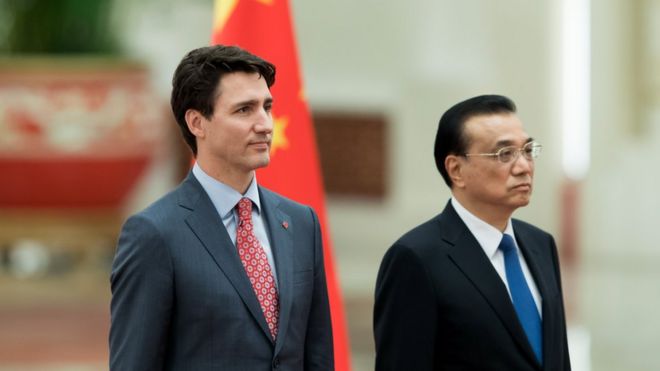 GETTY IMAGES
GETTY IMAGES
The arrest of Chinese telecoms executive Meng Wanzhou at the request of Washington sent the Chinese-Canada relationship spiralling into crisis. Caught between two superpowers, what are Canada's options?
When Wenran Jiang heard the news that Canada had detained Huawei executive Meng Wanzhou, he knew it spelled trouble.
In an op-ed in a national Canadian newspaper he "called for all sides to cool down", the senior fellow at University of British Columbia's Institute of Asian Research told the BBC.
"That was literally the second day the news broke, because I knew this was not easy to navigate."
He predicted the 1 December arrest of the high-profile Chinese senior executive could "snowball out of control" and do "permanent damage to a delicate Canada-China-US relationship".
The US is requesting Ms Meng's extradition on charges of violating US sanctions on Iran through Huawei's business dealings, allegations that she and the company deny.
Soon after Ms Meng - who is also the daughter of Huawei's billionaire founder Ren Zhengfei - was arrested, China demanded that Canada release her or face consequences.
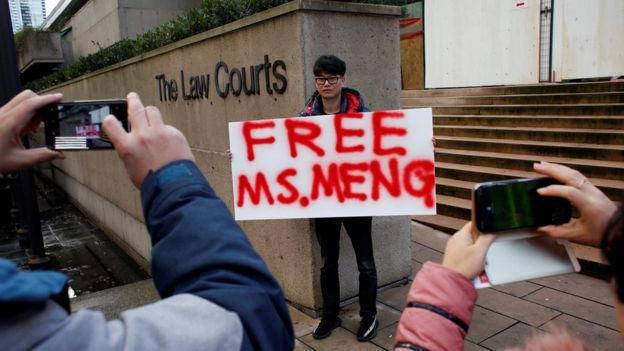 REUTERS
REUTERS
Within days, two Canadians, former diplomat Michael Kovrig and businessman Michael Spavor, were taken into custody in China on charges related to "national security".
'Freeze' that could last years
Many analysts believe they were tit-for-tat detentions.
"[Chinese officials] have denied the [detention of] two Canadians are related but of course nobody believes it's not related, nobody believes it's purely coincidental," Mr Jiang told the BBC.
A third Canadian national was arrested this week, though Canadian officials say this latest incident does not immediately appear linked to the Huawei dispute.
The diplomatic conflict has also had an impact on Canadian business interests.
Canada's Automotive Parts Manufacturers' Association had been pursuing Chinese automaker investment for more than two years but reciprocal interest has suddenly cooled.
"They've told us they're going to continue doing the due diligence, but any manufacturing decision is going to have to wait out the resolution [of Ms Meng's case]," Flavio Volpe, the organisation's president, told the BBC.
"And they're talking about a freeze that could be years, not weeks."
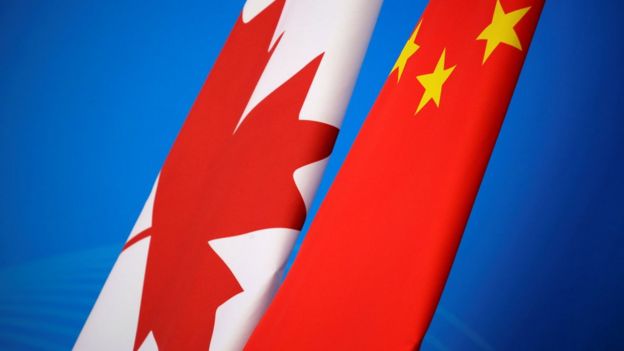 REUTERS
REUTERS
Parka maker Canada Goose has also been affected, announcing it's putting off the planned opening of its first store in China amidst public anger at Ms Meng's arrest.
The Global Times - the state-backed Chinese newspaper - has warned that "Canada's farming and forest sectors may be next in line to feel the pain due to China's soured relations".
'We're going into a fairly deep valley'
David Mulroney, a former Canadian diplomat to China, says the relationship between the two countries has always had its ups-and-downs.
But he says "we're going into a fairly deep valley. And I think we'll be in it for some time".
He also said Canada made for a "handy scapegoat" for China to "kick and whack" for the arrest while it works out its trade dispute with the US.
Canada's crisis management tactic has been to state that there has been no political interference in Ms Meng's arrest and that the extradition proceedings are being conducted in accordance with the rule of law.
It's an appeal China has so far rejected.
On Tuesday, Chinese foreign ministry spokeswoman Hua Chunying was asked about recent remarks on the case by Canada's Foreign Minister Chrystia Freeland and her US counterpart Mike Pompeo.
Ms Hua, calling Ms Meng's detention "illegal", said that "whatever dignified excuse they may use or whatever 'legitimate' cloak they may try to put on, they will be ridiculed for all these flagrant disregard for facts and the contempt of the rule of law".
On Canada's diplomatic efforts, Mr Jiang said: "You cannot continue to repeat the same line when the other party is not even accepting the legitimacy of that explanation".
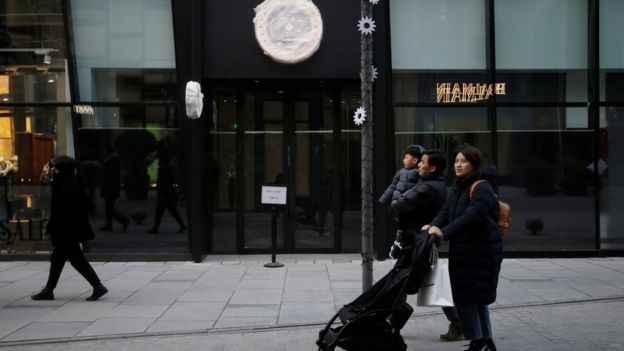 REUTERS
REUTERS
He says a few things have fuelled China's scepticism and muddied Canada's message.
First were remarks by US President Donald Trump last week that he could intervene in the Huawei executive's case if it helps to avoid a further decline in US relations with China.
Mr Jiang said that China was frustrated by reports of efforts by Australia, the US, Canada, New Zealand and the UK intelligence agencies to block Huawei - one of its leading tech companies - from supplying equipment for their next-generation 5G wireless networks over national security concerns.
He also said that Chinese officials have made note of criticism, including by American economist Jeffrey Sachs, of the United States' request for Ms Meng's extradition to face charges of violating US sanctions on Iran.
On Wednesday, Prime Minister Justin Trudeau said that Canada stands up for its citizens in difficulty abroad "by applying a set of robust principles around rule of law, around expectations the rule of law will be followed around the world".
He pushed back at questions from journalists on whether it was time for Canada to do more to tackle this diplomatic crisis.
"In many cases, escalation or very strong political statements can actually end up being counterproductive to the goal, which is to get Canadians freed, to get Canadians back home to safety," he said.
Canada 'alone'
Former diplomat Mr Mulroney says Canada has few options now but to let the legal process for the extradition run its course.
"We're in a terrible situation but we've got to have the courage to continue to focus on what's right and to continue to make our case not just in Beijing but with a lot of like-minded countries who might be able to help us," he said.
Meanwhile, former Canadian foreign minister John Manley told the BBC that "Canada is alone in the world on this".
"I don't know what the United States is offering us in return for this pain. The tariffs on steel and aluminum and softwood lumber are still there," he said.
Both he and Mr Jiang suggest Canadian officials should take a hard look at the merits of the US case for extradition, especially in the wake of Mr Trump's remarks suggesting he would intervene if it could help achieve a trade deal with China.
"I think we have to do a good assessment of what's in our interests in this case," Mr Manley said.
And Mr Jiang says the case has gone beyond declarations that Canada is simply complying with its extradition treaty obligations.
He suggests Mr Trudeau get on the phone to Chinese Premier Li Keqiang to discuss the dispute directly, and that Ms Freeland offer to fly to Beijing if necessary to make the case it is not part of a conspiracy with the US, as Chinese officials have charged.
Mr Jiang said a case could be made for a crisis group to be established between the countries to ensure communications at the diplomatic level on both Ms Meng's case and on those of the Canadians currently in Chinese custody.
Ms Meng, who has been released on bail, is next due to appear in court 6 February.





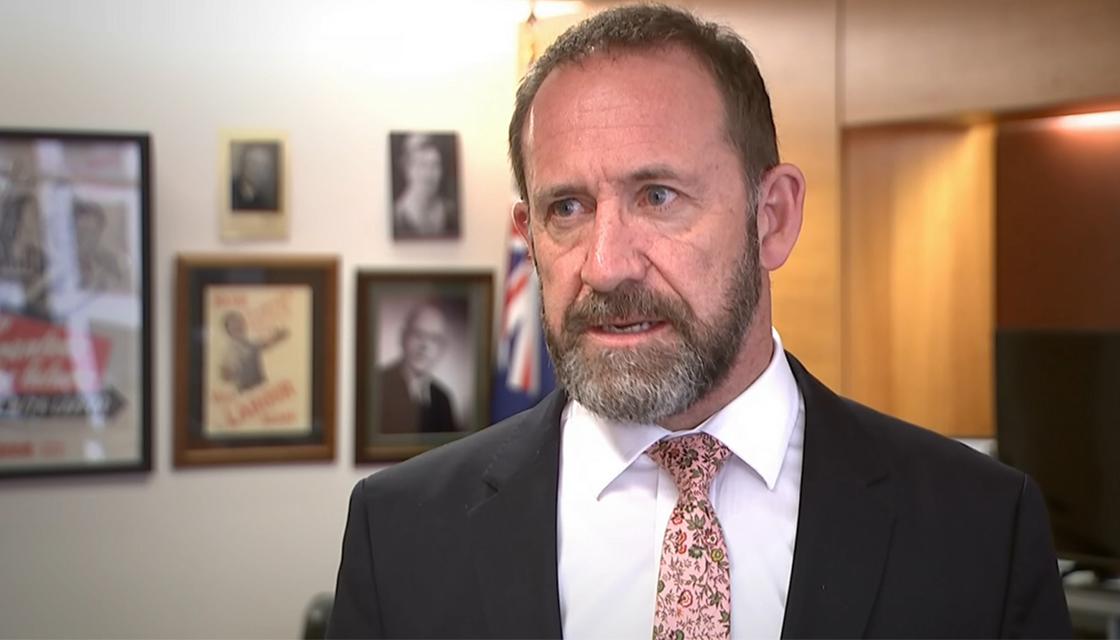
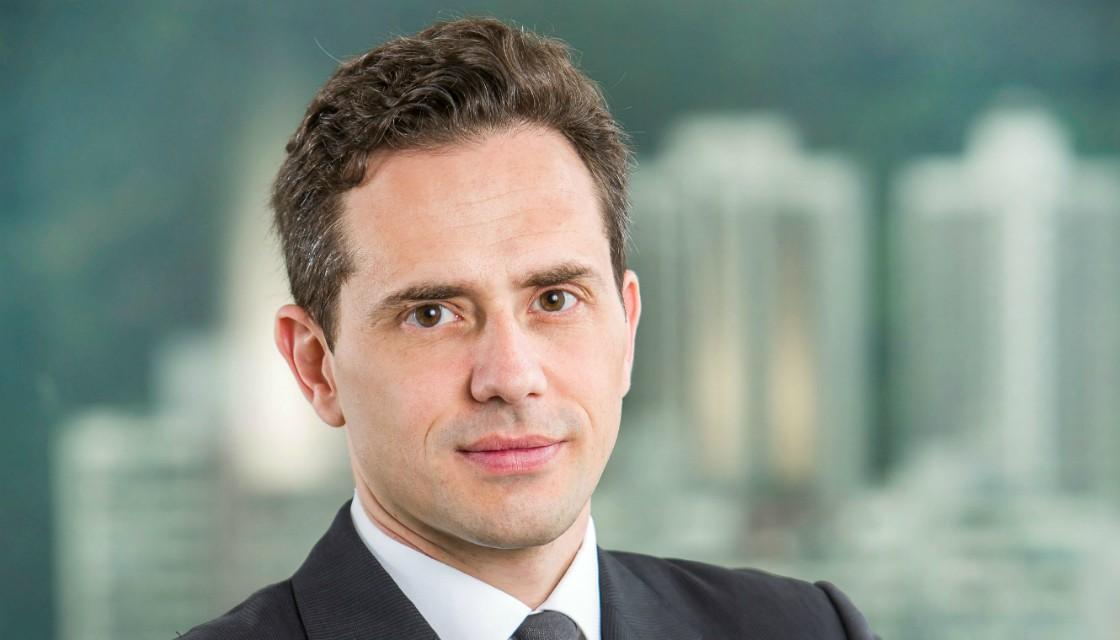
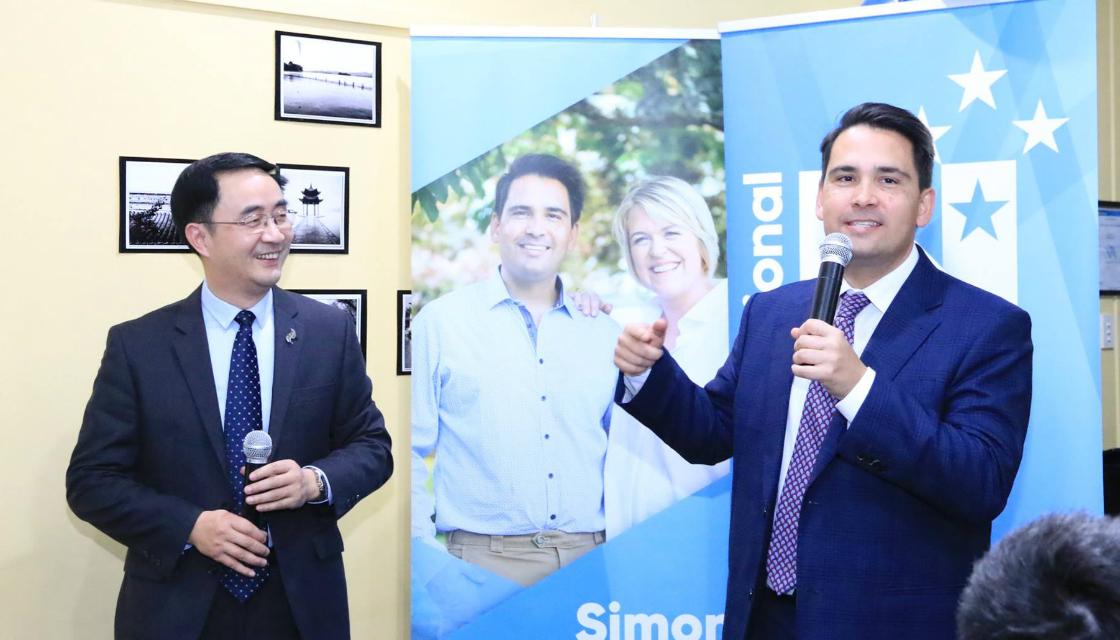
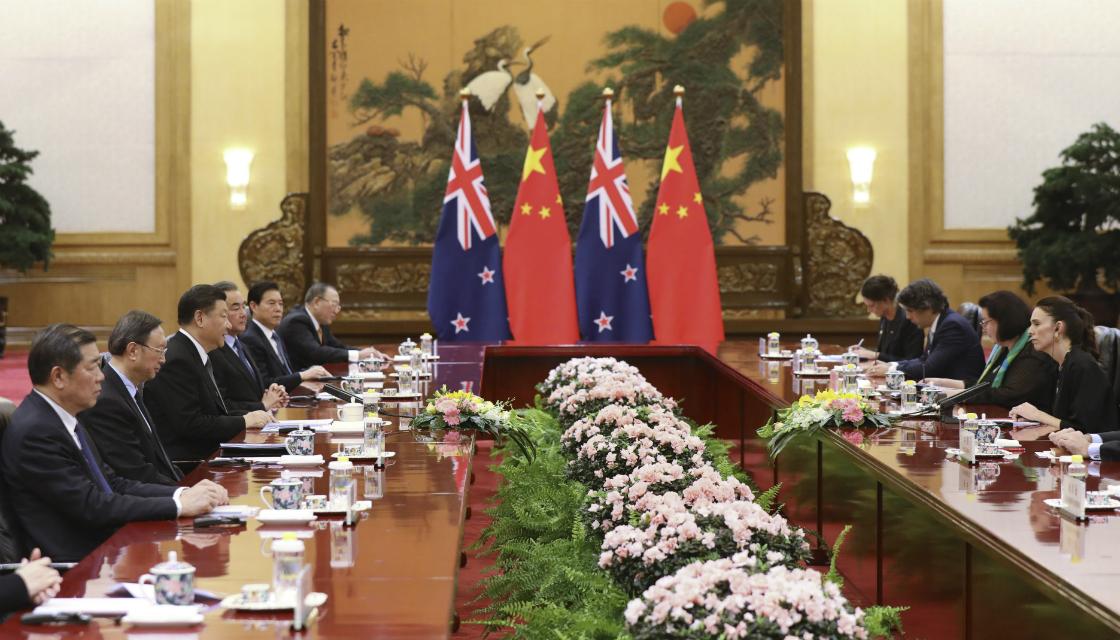
No comments:
Post a Comment
Comments always welcome!